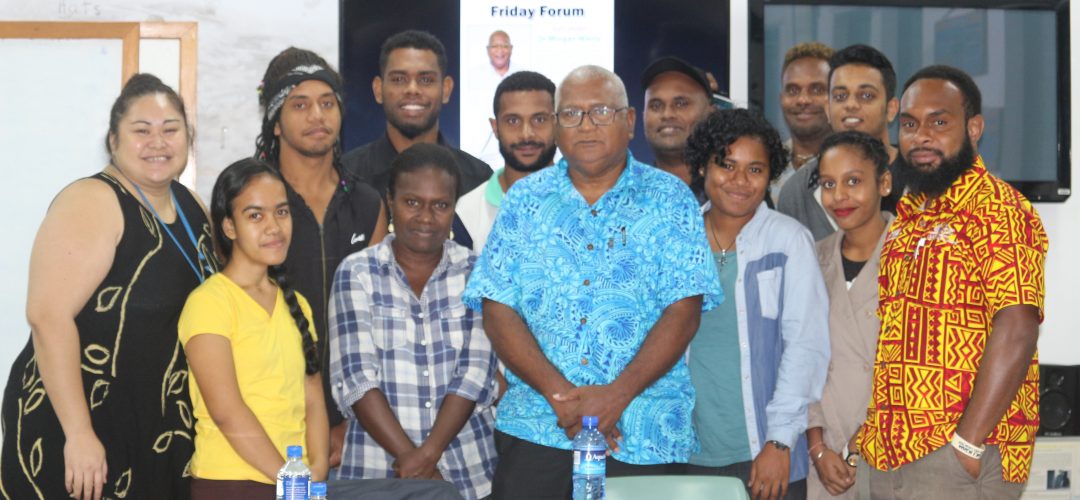Climate expert briefs EJN project reporting team to Sols

Dr Morgan Wairiu (middle) with USP Journalism students in the Wansolwara newsroom at Laucala campus. Picture: JUNIOR OIOFA
By DIPESH KUMAR
An increase in global temperatures can prove fatal for the Pacific ecosystem, causing permanent detrimental damage if urgent action is ignored over the next 12 years.
These were the words of Dr Morgan Wairiu, the deputy director of USP’s Pacific Centre for Environment and Sustainable Development, while addressing journalism students on how to improve climate change reporting at Laucala campus recently.
The discussion forum with Dr Wairiu was part of USP Journalism’s preparation for its environmental reporting project in the Solomon Islands as part of the Internews/Earth Journalism Network’s Asia-Pacific Media Grant 2019.
Dr Wairiu warned that the global average temperature is now 1 degree while the maximum increase in the temperature that the Pacific Islands could handle was 1.5 degrees according to projections.
Dr Wairiu, who hails from Guadalcanal in the Solomon Islands, was recently one of the lead authors in the 2018 Intergovernmental Panel on Climate Change (IPCC) 1.5C special report, which was an assessment on what had been done so far and the feasibility of keeping the global average temperature below 1.5C.
This year, he was selected as the co-ordinating lead author for the “Small Islands” chapter in the IPCC Sixth Assessment Report(IPCC AR6). The IPCC releases the assessment reports every five years, with the most recent one (IPCC AR5) released in 2014. Dr Wairiu would be co-ordinating and guiding a number of authors within the “Small Islands” chapter of the sixth assessment report.
“Once we reach 1.5 degrees there will be permanent damage to all our ecosystems including both natural and human systems. That’s why the Pacific countries are always negotiating to keep the global average temperature well below or at 1.5 degrees Celcius,” he said.
“Going beyond 1.5C will kill most of the ecosystems within the Pacific so our survival is at stake if we reach 1.5C.”
He said predictions pointed to a timeframe of 12 years to reach the global average temperature of 1.5C, adding transformational change was required to reduce greenhouse gases.
“I’m not talking only about the Pacific. It has to be everybody’s commitment. Don’t emit the greenhouse gases or the carbon dioxide, that’s the main gas. We have only a small window of opportunity, which is 12 years. By the year 2032, we’ll reach 1.5 degrees and that will be very detrimental to Pacific Islands’ ecosystems,” Dr Wairiu said.
“Most of the Pacific countries agree that we need to keep temperatures at 1.5C or well below 1.5C. Exceeding 1.5C will be devastating for the Pacific Island countries and we hope that global communities will listen to us and do their part to reduce emissions.”
Dr Wairiu said observations on the temperature increase began in the 1800s and those reports were used as reference to highlight the significant increase in temperature.
“Since observations began in the 1800s up until now we have observed a significant increase in temperature. We are using 1850 as a reference year and when they talk about the period we are using to monitor the climate, we use the French period from 1850 to 1900. So the average temperature between those years is our reference point,” he said.
“Any change from that reference letter is the observation of the change. Since the reference period, the global average temperature has now increased by 1C.”
He said journalism students had a crucial responsibility not only within their community but globally to report on environmental and climate change issues.
“Your program is very important because you take care of information dissemination, so while you are putting together all those information make sure that the information is shared with the community, including the corporate community, so they are all aware of the plight of the people in the Pacific,” he said.
- Dipesh Kumar is a final-year journalism student at The University of the South Pacific’s Laucala campus in Suva. He is also chief of staff of Wansolwara, USP Journalism’s student training newspaper and online publication.










